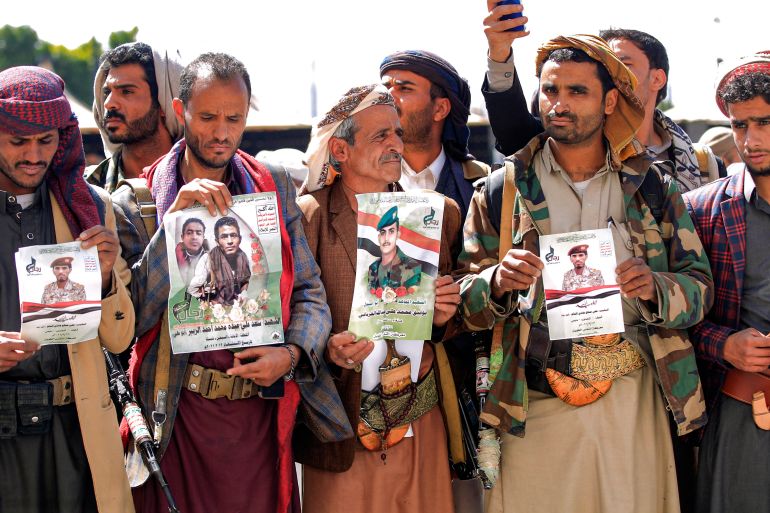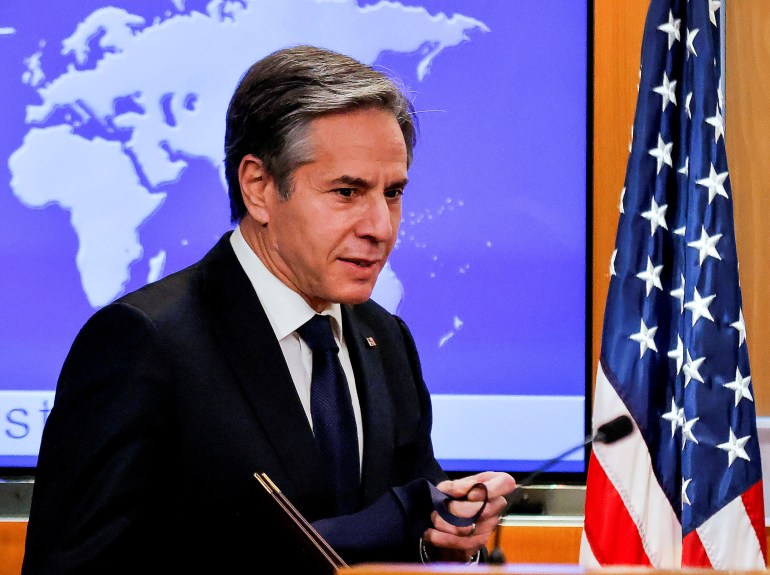Biden admin ends Trump-era Houthi ‘terrorist’ designation
The ‘foreign terrorist organization’ designation threatened to stifle aid and the economy in war-torn Yemen.

The administration of President Joe Biden has formally delisted Yemen’s Houthi movement as a “foreign terrorist organization” and “Specially Designated Global Terrorists”, undoing the last-minute move under former President Donald Trump that the United Nations and aid groups said threatened to further devastate the war-torn country.
The move comes as the Biden administration continues to change tack on the US approach to the war in Yemen, announcing on February 4 that it would end the US support for offensive operations for the Saudi Arabia-led coalition that intervened in Yemen’s civil war in 2015, a year after the northern-based Houthis kicked President Abdu-Rabbu Mansour out of the capital Sanaa.
Keep reading
list of 3 itemsHalf of Yemeni children under 5 face acute malnutrition: UN
UN ‘alarmed’ at military escalation in Yemen’s Marib
Aid groups, the UN, and US legislators had decried the Trump administration designations, which froze any US-related assets of the Houthis, banned Americans from doing business with them and made it a crime to provide support or resources to the movement. It went into effect on January 19, a day before Trump’s term ended.
“The designations came at a time when the country was facing an unprecedented set of catastrophes. We had famine warnings where 16 million people – that’s one in two Yemenis – were close to starvation. COVID-19 had battered the economy. People have lost their jobs. Food prices have gone up,” Saltana Begum, the Norwegian Refugee Council’s (NRC) advocacy manager for Yemen, told Al Jazeera.
“Our concern was that the designation would paralyse what is the world’s largest aid response,” she said. “There was the threat that people like myself could be criminalised or prosecuted for delivering aid.”
The UN says Yemen is suffering from the world’s worst humanitarian crisis amid a Saudi blockade, air raids and allegations of war crimes committed by both sides.
While the Trump administration made exemptions for aid groups working in Yemen, observers said they were not broad enough for a country where the majority of the population is living under Houthi control.
Secretary of State Antony Blinken, in a statement announcing the lifting of the designations last week, called the move “a recognition of the dire humanitarian situation in Yemen”.

He said three Houthi leaders – Abdul Malik al-Houthi, Abd al-Khaliq Badr al-Houthi and Abdullah Yahya al-Hakim – will remain subject to US sanctions “related to acts that threaten the peace, security or stability of Yemen”.
He added that the US is identifying and monitoring those responsible for attacks on commercial shipping in the Red Sea and drone and missile attacks on Saudi Arabia “as additional targets for designation”.
The UN, following the announcement, said the “revocation of the designations will provide profound relief to millions of Yemenis”.
Shift towards diplomacy
The reversal of the designations, some provisions of which had already been paused by the Biden administration on January 25, is part of a larger shift away from the Trump administration’s approach to Yemen’s civil war.
The Houthi “terrorist” labelling came as part of a final push by the Trump administration in its “maximum pressure” campaign against Iran and its allies. The Houthis are aligned with Iran but have denied working at Tehran’s behest.
Nabeel Khoury, the former deputy chief of mission at the US embassy in Sanaa under the administration of then-President George W Bush, told Al Jazeera the Houthis, while likely guilty of human rights violations, do not appear to fit the “foreign terrorist organization” designation compared with past groups given the label.
“The US has always maintained we do not speak to terrorists or negotiate with terrorists. So if you designate the Houthis, as such, you’re making it very difficult … for the Biden administration to be able to negotiate,” he said. “Which is probably what the Trump administration was trying to do.”

The Trump administration also maintained close ties with Riyadh, with Trump vetoing bipartisan legislation in 2019 that would have ended controversial US support of the Saudi Arabia-led coalition, which largely consists of intelligence sharing, spare parts support, and training. Casualty trackers say that thousands of civilians have been killed by the US-supported Saudi air attacks since 2015.
Biden’s end of US support to the Saudi coalition and a halt to arms sales related to the offensive operations have been seen as a symbolic move indicating the US interest in ending the conflict, although many questions remain about the more practical implications.
The appointment of Tim Lenderking, a well-respected career diplomat, as special envoy to Yemen has also indicated that the US is prioritising finding a diplomatic solution to the fighting, which has remained elusive during several UN-led attempts at resolution.
However, Baraa Shaiban, the MENA caseworker for the legal aid NGO Reprieve, said he was concerned the “Biden administration is rushing and has quickly stripped itself from all of the leverage points they have”.
He told Al Jazeera the US should have focused on assuring humanitarian access while still maintaining pressure, noting the Houthis launched an offensive on Marib, the last Yemeni government’s last northern stronghold, in the wake of the Biden administration’s delisting announcement.
On Tuesday, the US State Department, in a statement, called on the Houthis to stop the offensive, calling it “the action of a group not committed to peace or to ending the war afflicting the people of Yemen”.
“This assault will only increase the number of internally displaced persons and exacerbate the humanitarian crisis in Yemen,” the statement said, saying if the Houthis are serious about negotiations they should “cease all military advances and refrain from other destabilizing and potentially lethal actions”.
With the Houthis feeling they are “gaining ground”, Shaiban said, they will likely have little interest in an internationally-brokered peace agreement.
He added the Biden administration should focus on supporting internal reconciliation, arguing the Houthis would likely reject US-brokered talks.
“The problem is the Biden administration is not understanding that the Houthis consider themselves in a war with the US,” he added. “And so it doesn’t matter how much you try to show good signs, they still see [the US] as the big Satan.”
Former diplomat Khoury, for his part, said the Houthis have indicated they are open to a US-led mediation.
He added: “I’ve always thought that only the US can intervene as a big power from the outside and push on the parties towards peace.”
‘Cautiously optimistic’
NRC’s Begum said the aid organisation is “cautiously optimistic” in Biden’s “massive shift from the previous administration”.
But she added the situation remains dire with the increase in fighting and aid funding falling woefully short.
“We really need the US to push for a nationwide ceasefire, to act as an honest peace broker to really put pressure on the conflict parties … and push them back to the negotiating table,” she said.
“The conflict is at the root of starvation and the destruction of the economy,” she said. “That’s why the country is on its knees at the moment.”